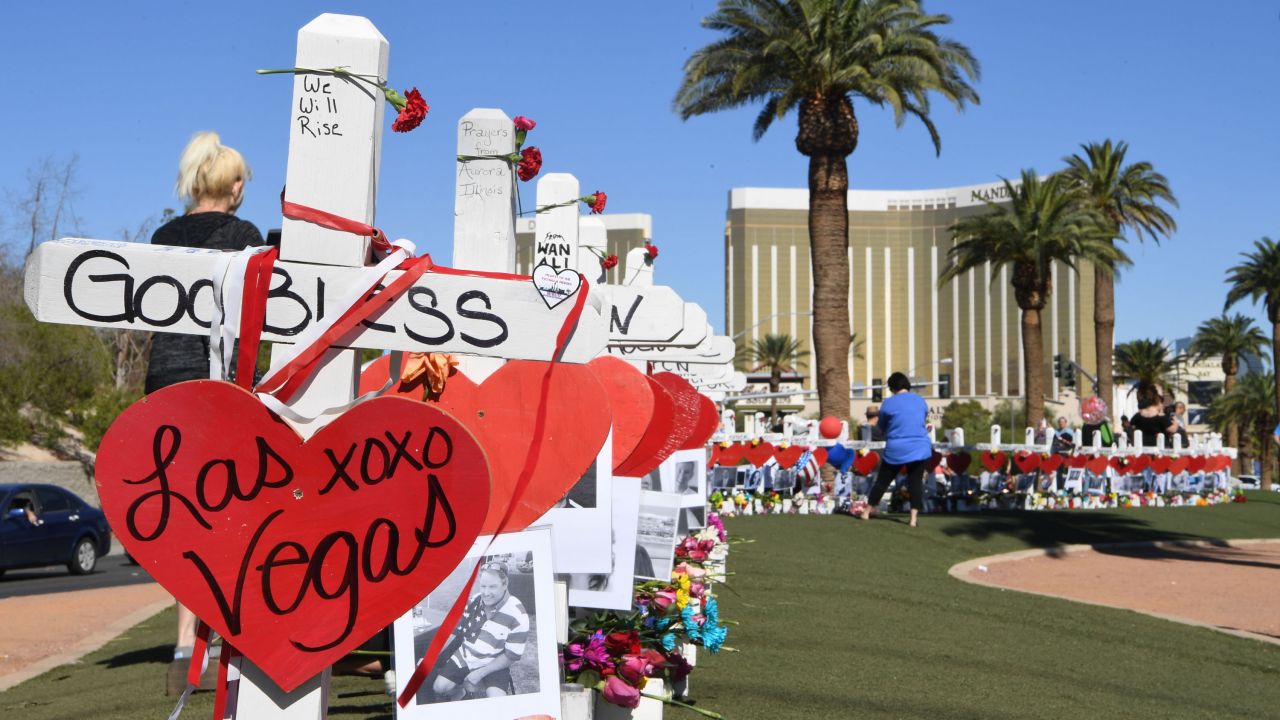
Mourners gather at the "Welcome to Las Vegas" sign where Greg Zanis, a retired carpenter from Chicago, placed 58 crosses to honor those who were killed during the Route 91 Harvest country music festival shootings in Las Vegas on Oct. 6, 2017. (Photo by Denise Truscello/Getty Images)
In the United States, you will hear madmen insist that:
59 dead and 500 injured in Las Vegas are the price of freedom.
49 dead and 58 wounded in Orlando, Florida, are the price of freedom.
27 dead and 2 injured in Newtown, Connecticut, are the price of freedom.
And so it goes. This truly is insanity. We can try to deal with that small percentage of the population who collect or own guns for hunting, target shooting or security, but to claim as a constitutional right the possession of firearms intended for nothing less than brutal, gruesome warfare strains credulity. These are killing machines with no purpose other than to maim and destroy.
Of course, we’ve said this time and again and will doubtless say it again because the foolish cycle remains unchanging.
Every time someone unleashes gun violence and takes multiple victims, we begin with adamant, genuine grief and a collective wringing of hands. Then we are told that the immediate aftermath is not the time to bring politics into a time of sorrow, and then that, yes, maybe we will look into the license to kill we permit with our lax gun laws. Then the flowers will fade, the candles will gutter, the memorials will be over and nothing will be done.
But beyond the horrific scale of the Las Vegas killings, there were a couple of things that struck us as different about this latest tragedy. Usually, the National Rifle Association goes into its bunker and assumes radio silence for a week or so after these mass murders take place, and as if on cue Sunday morning, NRA CEO Wayne LaPierre suddenly popped up on CBS’ Face the Nation, blaming the violence not on the millions and millions his organization spends holding gun control at bay but, you guessed it, “the elites.” He said:
They all protect themselves with armed security. I mean, they criticize the NRA. You want to talk about irresponsible use of firearms? The No. 1 person teaching irresponsible use of firearms is all these elites’ employer, the Hollywood television gaming industry. We spend millions teaching responsible use of firearms. They make billions every single day, teaching irresponsible use of firearms. They’re so hypocritical it’s unbelievable.
What was different this time was that just a couple of days after the Las Vegas deaths, for once the NRA seemed in favor of new gun laws, in this case forbidding the sale of the bump stocks that killer Stephen Paddock used to turn his semiautomatic rifles into automatic weapons that could spray the concert area below him with hundreds of bullets.
But hold on. What the NRA’s carefully parsed statement actually said was that the group was urging the Bureau of Alcohol, Tobacco, Firearms and Explosives “to immediately review whether these devices comply with federal law. The NRA believes that devices designed to allow semi-automatic rifles to function like fully automatic rifles should be subject to additional regulations.”
In other words, as John Cassidy reported at The New Yorker, “the NRA was looking to convert a legislative threat into a regulatory issue. Since fully automatic weapons are already illegal, it wasn’t giving up any substantive ground, and it was trying to prevent an open political debate in areas where it knows it is vulnerable.”
So don’t be fooled by their rhetorical camouflage. In truth, the NRA still wants to steer clear of any open debate in Congress that conceivably could change minds and even lead to other new gun control rules already widely favored by the public — like a renewal of the ban on assault rifles, universal background checks and a federal data base tracking gun sales.
Which leads to the second thing we noticed — the repeated use of the word “evil” to describe the deadly Vegas attack. It was “an act of pure evil,” President Trump said the morning after. And Don Turner, president of the Nevada Firearms Coalition, state branch of the NRA, told Mary Louise Kelley of NPR’s All Things Considered:
Putting more new laws on the books is not going to stop it. This has been a conundrum humans have fought with since Cain and Abel. You cannot legislate compliance with evil. People are going to be evil. They’re going to do evil acts for one reason or another, and there’s not any laws in the world would stop them. If we had a total ban on guns, they would’ve used a semitruck or a bomb.
That the acts of mass murderers are evil is undeniable. The problem is that if you insist that civilization cannot avoid the generation of evil acts — that the force of evil is out of the control of mere mortals — you are throwing up your hands and shirking responsibility for taking action.
It’s a stinking cop out.
Bruce Clark, who writes the Erasmus blog on religion and public policy for The Economist magazine, notes that the emphasis on evil makes this assumption:
If evil is an inexorable feature of a fallen plane of existence, one that has been tainted from the very start of things by human sin, then no policy measures will ever remove it. The only response to evil is to identify it clearly, to avoid secular soft-headedness, and perhaps to mitigate its effects as and when they arise, without presuming to abolish it. In other words, gun control will not work.
You can’t change fundamental human nature, the NRA and its allies shout. Wayne LaPierre proclaims, “[I]f we could legislate morality, we would have done it long ago.” But as Clark concludes, “whatever you may think about the causes of badness in the world, it seems manifestly absurd to suggest that the legislator should not try, at least, to reduce the scope for evil to prevail.”
We must continue to try. Yet given the nature of evil, why bother, LaPierre suggests. He knows the answer. More guns. But only for “the good guys,” of course.
Madness.




